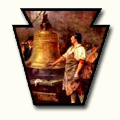| |
Page 28
HISTORY OF CLEARFIELD COUNTY.
"28th.-We came to Weheeponal, where the road turns off for Wioming, and slept
this night at Quenashawakee.
“ 29th.-We crossed the Susquehanna over the Big Island, my companions were now
very fearfull, and this night slept a great way from the Road, without a fire,
but we could not sleep for bugs and mosquetoes.
" 30th & 3 rst.-We were glad when it was day, that we might sett out ; we got
upon the Mountains, heavy Rains all night, the Heavens alone were our covering,
and we accepted of all that poured thence.
“ August 1st.-We saw three Hoops on a Bush, to one there remained long white
hair ; our horses left us, I suppose not being fond of the dry food they met
with on the Mountain, tho with a good deal of trouble we found them again. We
slept this night on the same mountain.
“ 2nd .-We came across several places where two Poles Painted Red, were stuck in
the ground, in order to tye their Prisoners ; we arrived this night at
Shinglimuce (Clearfield), where was the above marks ; ‘tis a disagreeable and
melancholy sight to see the means they make use of, according to their critical
way, to punish Flesh & Blood.
“ 3rd.-We came this day to a part of the River Tobees (Toby), over the
mountains, a very bad road.” Having now passed this vicinity, the journal
recites the unimportant features of the trip until the arrival at Fort Venango.
“ 7th.-We arrived at Fort Venango, situated between two mountains in a fork of
the Ohio River. I prayed the Lord to Blind them as he did the enemies of Lot and
Elisha, that I might pass unknown ; when we arrived, the Fort being on the other
side of the River, we haled, and desired them to fetch us over, which they were
afraid to do, but showed us a place where we might
ford; we slept this night within half gun shot of the fort.”
Having fulfilled the object of their journey, the party started to return, and
on the fifteenth day of September reached the “ Susquehanna, & crest 6 times, &
came to Calamawesink, where had been an Old Indian town ; in the Evening there
Came 3 Indians, and said they saw two Indian tracts where we Slept turn Back, so
we were Sure that they followed us.
“ 16th & ITth.-We Crossed Over the big Mountain (Allegheny.)
“ 18th.-Came to Big Island, where we had nothing to live on, we were Oblidg’d to
lye to hunt.
“ I9th.-We met with Twenty Warriors who were Returning from the Inhabitants,
with five Prisoners & I Scalp, Six of them was Delawares, the Rest Mingoes, we
Sat Down all in one Ring together, I Informed them where I had been & what was
done, they asked me to go back a Little, and so I did, and Slept all night with
them, and inform’d them of the Particulars ; they said
they did not know it, if they had, they would not have gone to war : be strong
if you make a Good peace, then we will bring all the prisoners Back again ; they
kill’d two Deer, & gave us one.”
|
|






